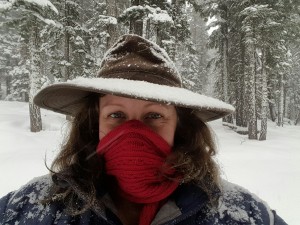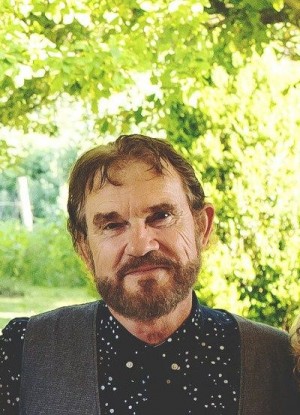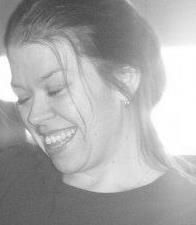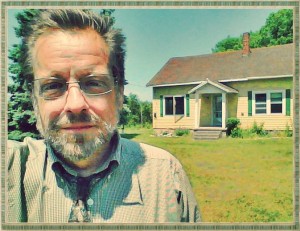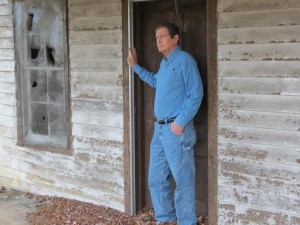Before Arnie Sandlin could drop a fistful of ice melt outside the doorway of The Ranger Lounge, his stomach exploded and he was thrown five feet across the room into a poker table. Dutchie Selby stepped into the lounge, ice crunching under his feet, a Benelli M‑4 in his hands.
Dutchie walked over to Arnie's corpse and eyeballed the intestines hanging from his gut. Dutchie's head cocked to the right when he noticed Arnie's blood-splattered face smiling back at him, his hand still gripping the ice melt.
“Cold out this mornin', ain't it, Arnie?” he asked the corpse with a laugh. “I know you're not open, but you don't mind If I get a drink?”
Dutchie leaned the Benelli against a table and walked around the bar. Where's the good stuff? he asked himself. Ahhhh, there it is he thought, grabbing the Jameson. He poured a double and took a seat in the empty lounge.
“Business isn't too good this mornin', Arnie.”
He took off his brown cattleman's hat and placed it on the table. He took a swig and looked at the badge on the hat that said Ward County Sheriff's Department, the state symbol for North Dakota in the middle. The Ranger Lounge was dark and empty. One TV in the corner had a crumpled up looking weatherman on the screen. Dutchie listened as the weatherman went on about it being minus twenty degrees in north central North Dakota.
“What an asshole,” he said after the weatherman mentioned the temperature would be the same and a storm was coming. “No relief in sight? What a jack-off,” he said downing the rest of his drink.
Dutchie grabbed the Benelli, walked back over to Arnie, and crouched down.
“Where's Jimmy Red Bear?” he asked. “You don't know?”
He smacked his lips when the open door welcomed in the Dakota winter wind. It felt like tiny pins stabbing him in the back.
“No matter,” he said. “When Red Bear finds you, let him know I was looking for him.”
He stood up and stepped over Arnie's body. Before he walked out into the parking lot, he snatched up the shell casing.
“Wouldn't want to forget that.”
The Ranger Lounge was five miles outside the city limits, out in the prairie where the wind was fierce. Dutchie jumped into his patrol car, shivering. He looked in his rear view. The open door of the lounge was swallowed by the silence of January, vanishing from his sight once he turned the corner onto 83.
***
Jimmy Red Bear grew up on the Fort Peck Reservation in Montana, but after he took control of the Rez drug trade he eventually made enough to buy a house and a few businesses in Minot, leaving his cousin Harrison in charge of the business back home. One of the businesses Jimmy bought was a pizza joint called Chief's Pizza. He also owned a few warehouses and The Ranger Lounge. It was midday when Larry the Pigeon knocked on Jimmy Red Bear's door.
“What the hell do you want?” he asked the Pigeon.
“Someone shot up your place.”
“What place?” Jimmy asked without emotion.
“The Ranger…fuckin' Arnie Sandlin's dead.”
Jimmy Red Bear opened his front door wider, letting the Pigeon inside.
“Thanks, Jimmy. It's damn cold out there.” The Pigeon started to walk up the stairs, but Jimmy blocked his way.
“My damn kids are home. Just tell me here.”
“Got any coffee? It's real cold, Jimmy.”
“No. No, I don't have any coffee, you mutt. Tell me.”
Larry's face straightened up. “Yeah, okay, Jimmy. Minot PD is all over The Ranger. Someone opened the door and blasted Arnie.”
“How do you know about Minot PD?”
“Merry went in for her shift and found Arnie. She's the one that called the cops.”
“Jesus, how's she doing?”
“Pretty shaken up. Cops took her statement and sent her home.”
“Go to her house and bring her to my warehouse office over on North Broadway.”
“You ain't gonna hurt her, are ya, Jimmy?”
Jimmy snapped his hand back and punk-slapped the Pigeon across the face. Jimmy showed no emotion when the Pigeon grabbed his cheek.
“No, I'm not going to hurt her. Are you stupid? I need to know what she knows. I don't need any heat coming down on me or my family. Christ, Larry, you dumb son-of-a-bitch. I have no idea how you even walk on two legs. You must be at least three-quarters retarded.”
“Sorry, Jimmy…”
“Why are you still here?”
***
Dutchie sat inside Lilly's Diner on the north end of town waiting on his third cup of coffee and the check. Butch Carson walked over to Dutchie, who was gazing into a street light watching the snow fall out from the dark of the sky.
“Coming down hard today. The weatherman said we could wake up with six inches.”
“So I hear,” Dutchie replied, watching Butch fill his cup.
“Same as usual, Sheriff Selby,” Butch said slapping the check face down.
“Butch, let me ask you something.”
“Anything,” he replied.
“Is there a Lilly Carson?” he asked, still watching the snow fall.
“Sure ain't,” he said.
“Not a Mrs. Lilly Carson?” Dutchie asked, taking his head away from the snow.
“Nope, divorced. The former Mrs…or, should I say the many former Mrs. Carsons have all moved on.”
“How many Mrs. Carsons have there been?”
“Five. Six, if you count that one-night marriage to the show girl in Vegas.”
“Six times,” Dutchie replied shaking his head in amazement. “How come none of them ever stuck around?”
“I dunno, Sheriff. I guess they couldn't take the cold. The seclusion does something to a person's mind if you're not used to it. Never bothered me much. I couldn't really say. They always get up and leave.”
“Any kids?”
“Three daughters and one son. They've all moved out.”
“Local?”
“Nah. The closest one is in Fargo, but she's getting ready to move down to Nashville.”
“The isolation get to them, too?”
“If I knew, Sheriff, I'd tell ya, but I haven't got the slightest idea. One minute you're their everything. The next minute, they hate you. Then moments later they get married, move to Tampa, and want to love you from a distance. They call and all but only once every few weeks.”
“Why not move yourself, Butch?”
“What? And leave this Shangri-La?” he said looking around the empty diner.
Dutchie reached into his coat and pulled out a bottle of Oxy he had taken from a drunk he arrested the day before.
“You okay, Sheriff?”
“Huh?” Dutchie replied, looking at the name on the bottle of Oxy.
“The pills. Are you sick?”
Dutchie swallowed two with a swill of coffee.
“Nah, just a sinus thing. The damn cold, it gets to you. Ya know?”
“You betcha, Sheriff. My sciatica acts up every day before it snows. It's like a warning or something,” Butch said, filling up Dutchie's mug again, “I meant to tell you…”
“What?”
“Officer Belichick from Minot PD was in here this afternoon. You know him?”
“Yeah, decent enough guy.”
“He said Arnie Sandlin was gunned down in the front door of The Ranger. You hear anything about that?”
“Minot PD mentioned it to us.”
“Who would do such a thing? Arnie was a good old guy. Never bothered anyone. He said that whoever popped Arnie didn't take nothin'. No money, no liquor, nothing. It's strange to me.”
“What's strange?” Dutchie asked.
“Never mind me, Sheriff. I talk too much. I'll leave the policing to you guys.”
“No, go ahead. What's strange?”
Butch sat down in the booth across from Dutchie.
“Well, back when he sold the bar to Jimmy Red Bear, you know, after his wife died and he didn't want to take care of the place because he was always over at the cemetery, grief stricken and all…”
“Go on…”
“Well, he became very strange. Out there, really. He wasn't himself anymore. He let the place go to pot. It used to be us good old boys always over there. You know. The shop owners. The farmers. The firemen. You know, Sheriff. You've been in there.”
“He was married for 40 years. That would drive any man over the edge.”
“Not if you knew Arnie like I did. He was always up for a laugh and a drink. I tell ya. Sheriff, as soon as Jimmy Red Bear was involved Ol' Arnie turned recluse. Quiet. He wasn't the same.”
“Well, you know as well as I do that Jimmy Red Bear is, and always has been, on the wrong side of the bar. If you know what I mean.”
“You betcha, Sheriff. I know. It was that fuckin' prairie nigger that did it to him is what I'm getting at. I have no proof, but I'd bet my life on it. I don't know why. I don't wanna know. But I wouldn't blink an eye if something happened to Jimmy Red Bear. Asshole, if you ask me.”
The Oxy started to take hold of Dutchie. He felt the perfect stillness seep into his bones.
“Hold on, Butch. Don't go talking crazy.”
“I ain't gonna do nuthin', Sheriff. I was just sayin' that it's sad is all. Minot PD has no idea who did it either. Might be they never find out. And you know why? Because Red Bear has half of Minot PD in his pocket.”
“Now you're talking crazy, Butch.”
Butch looked at Dutchie–his sidearm resting in its holster, the gold badge on his jacket.
“Well, maybe someone ought to do something about Jimmy Red Bear.”
“What you just said to me, Butch. Don't ever say that to another person. You hear me?”
Butch waved his hand, “Don't mind me, Sheriff. I was jus' thinking out loud. You know me. Anyhow, I got to get ready to shut down,” Butch said.
“Hey, Butch.”
“Yeah, Sheriff?”
“You never mentioned why.”
“Why what?”
“Why Lilly's?”
Butch put down the coffee pot and looked around at the crusty old diner, and all the photographs hanging on the wall that reminded him of a better time. He noticed how they had faded and hadn't been dusted by him or his employees in years. He looked at the snow and mud mix melting into the rug he left at the front door, and the once fresh coat of yellow paint now brown and black. Butch sighed, maybe for his dilapidated diner. Maybe for his kids. Maybe for Arnie Sandlin.
“I guess to give the place a little class,” he replied.
Dutchie left the money on the table and pinned it down with a salt shaker. He put his hat on and headed out into the dark snow. What a bastard, he thought, his shoes slopping through the snow and muck. Before getting into his cruiser, he took one last look at the snow falling through the glow of the streetlamp. He liked that it was something falling from nothing. He smiled an Oxy-smile and climbed into his cruiser. He looked at the clock. 8:55. Butch had turned off the lights to the front of Lilly's by the time Dutchie turned over the engine and drove off. He hit a side street about a hundred yards away from Lilly's, parked next to a bunch of old storage facilities, and opened his cellphone.
***
The Pigeon and Merry opened the door to Jimmy Red Bear's warehouse. It was empty and cold. In the far corner was a giant throw-rug where a few standing lamps stood along with a few chairs and a couch. Jimmy stood on the rug, smoking a cigar.
“Finally, Larry. All day, you mutt,” Jimmy said.
“Sorry, Jimmy. I had trouble finding her place.”
“In this tiny city? With GPS and all that junk?”
“Jimmy, it wasn't…”
“Never mind,” Jimmy said, rolling his eyes.
Merry, in her usual dark jeans and blonde hair done up in one large braid, walked by Jimmy without saying a word. She took her puffy winter coat off and took a seat.
“How are you doing, dear?” Jimmy asked.
She sized Jimmy up but didn't say anything to him.
“It must've been traumatic. I'm sorry you had to find Arnie like that.”
“Tell Jimmy what you told me, Merry. Tell him.”
“Will you shut the fuck up,” Jimmy said. “In fact, go stand over there.”
The Pigeon, all six feet, two inches, and one hundred and fifty pounds of him, walked twenty feet away. With each step he took his head bobbed like a pigeon's.
“No, you dumb mutt! Go stand in the corner of the building. Far away!” Jimmy yelled.
The Pigeon bobbed to the far corner. When he got there, he looked back at Jimmy like a puppy who just got whacked across the ass with a newspaper after it had pissed all over the new rug.
“Great! Now you look like a creep standing over there.”
“What's that? I didn't hear you!” the Pigeon yelled.
“Go shit in a hat, Larry.”
“What? I didn't catch all of that! All I heard was you look great, Larry.”
“Oh yeah, that's it, Larry.”
“What?”
“SHUT UP!” Jimmy shouted across the warehouse. The Pigeon dropped his head.
“Sorry about that,” Jimmy said.
“It's your place. You can say and do what you want.” Merry replied.
“This bother you?” he asked, holding up the cigar.
“Nope.”
Jimmy tightened his lips and shook his head. He was trying to see if she was nervous, but she seemed more aggravated than bothered, like she could've been home watching her shows. Or out on a date. Or drunk. Anywhere but the cold warehouse.
“All right then, how about I cut to the chase?” Jimmy said.
“That would be fantastic.”
“What did you tell the cops?”
“Just what happened,” she said, crossing her legs.
“And that was…?”
“That I went to work. Got out of my car. The front door was open. And Arnie was dead with a fuckin' poker table on top of his head.”
“Did the cops look around?”
“Sure, everywhere.”
“Did they ask you anything else?”
“Like what?”
“About me or my family? Maybe about some of the people who drink there?”
“Just about you hardly ever being there. A few questions about Arnie.”
“What did they want to know about Arnie?”
“Just typical kinda stuff, ya know?
“No. What's typical?”
“If he always opened the lounge. If he had any enemies. If he ever mentioned anyone suspicious. You know, jus' crap like that,” Merry said, stuffing a piece of peppermint gum into her mouth.
Jimmy stood up from the edge of the couch that was next to the chair Merry was sitting in. He stamped out his cigar in an ashtray and folded his arms. He looked up at the ceiling and rocked back and forth on his feet. He looked to be in deep thought for a few minutes, then let out a breath.
“Now this is very important. I want you to really think when I ask you this one.”
“Okay.”
“What did you say about me when they asked about me?”
“Like I said, Jimmy. I just told them you're hardly around.”
“They didn't ask anything about Fort Peck, or maybe my cousin Harrison?”
“No. What the fuck does Fort Peck have to do with Arnie? Wait, did someone from the Rez kill Arnie?”
“Highly unlikely,” Jimmy said, unfolding his arms.
“I only met your cousin Harrison once or twice. He only came in when you were there. I don't think Minot PD has any idea who he even is. He's a handsome man, always polite.”
“Oh, yeah. Harrison is a good kid. But no, he didn't have anything to do with Arnie.”
Jimmy was another local business man to those who never met him, another guy sitting on a stool in the Ranger Lounge counting money. Some of the locals knew who he was, and knew what he was capable of doing to them if they crossed him. But he tried to fit in with the community, tried as hard as he could to come off as an upstanding citizen. He sponsored a Little League team. He even gave both time and money to The Saint Vincent DePaul. To those who didn't know him, he was a saint, but up close, underneath the skin, most saints are capable of atrocities. Merry knew it.
“We almost done here?” Merry asked.
“Almost. Your dad, Matt, used to own the farm out towards Max. The Shaw place?”
“Yeah. What of it?” she said.
“He died not long ago?”
“Been two years now,” she replied.
“That's too bad. He used to come into The Ranger a lot.”
“He was a fuckin' no-good drunk. Drove my mother to an early grave.”
“Never knew Vanessa. She was gone before I moved here.”
“I was twelve.”
“I'm sorry.”
“I'm not. The asshole drank away all the profits. All of his time at the bar, rather than spending time with his only child. And if he did make his way out into the fields, it was because the whiskey with breakfast straightened him out. He put us in the poor house. My mother died because she couldn't stand her own thoughts anymore.”
“How did she go, if you don't mind me asking?”
“Pills.”
“I'm sorry to hear that, “Jimmy said. “And your father?”
“Liver disease,” Merry said. “I'm sorry, but what does this have to do with anything?”
“You're tough as nails, Merry. You've been through a lot. It's no wonder why seeing Arnie dead didn't bother you much.”
“I'm not without a heart. I liked Arnie. Of course it bothered me.”
Jimmy refolded his arms. He knew he wasn't getting anywhere with her. He was pissing her off.
“You got a cigarette?” she asked.
He walked over to a desk, pulled out an old pack of Winstons, and tossed them on her lap.
“They're a bit stale. I don't smoke cigarettes. Someone left them here.”
“You got a light?”
Jimmy lit the cigarette for her with a Zippo. Merry noticed the Sioux Tribal decoration on the old silver lighter.
“Smoking will kill you,” he said.
“Yeah, I'll try not to make a habit out of it.”
Jimmy was about to ask her more questions when the phones rang. He had several phones throughout the warehouse. One was on a table where he was standing. One was over by the Pigeon, and a few others were scattered throughout the building. They all had different and distinct rings. Merry kept smoking. Jimmy looked at the phone on his desk then lifted his head towards the Pigeon.
“Want me to get that, Jimmy?” the Pigeon shouted.
Jimmy nodded his head yes. The Pigeon picked it up. In the distance Merry and Jimmy could hear the Pigeon saying, “Hello.” “Hello?” “Hello?” The Pigeon listened and then hung up.
“Who was it?” Jimmy asked.
“I dunno. No one said a thing.”
“What?”
“No one said anything!”
“Jesus Christ, get your ass over here and tell me!” Jimmy shouted.
“Yeah. Right,” the Pigeon said, running over.
Merry put out the cigarette on her hiking boot and dropped the butt on the floor. She felt the cold steel of the straight razor hidden in her bra. Months back, a drunk man at the lounge got rough with her when she went out to her car. He would've raped her in the backseat if it wasn't for Arnie pressing some steel up against his head. A Minot police officer had to try and restrain the man, but when the man began waving around a pistol, the cop called in for back-up. A Ward County Sheriff zipped into the parking lot after he heard the call. Merry watched the no-nonsense dark-haired Sheriff drop the guy with a single shot.
She listened to Jimmy and the Pigeon discuss the ringing phones, and when they gave up and figured whoever it was must've had the wrong number, the phone started to ring again. This time Jimmy picked it up.
“Hello,” he said. “Hello?”
“Who was it?” the Pigeon asked.
“No one said anything.”
The phone rang again. Merry couldn't help but crack a smile when the two men kept answering and then bashing the phones down.
“Something funny, bitch?” the Pigeon said.
“Watch your damn mouth,” Jimmy said.
“I didn't mean…the damn phones.”
“One more word out of your mouth, and I swear,” Jimmy said massaging his hip. The Pigeon knew under Jimmy's shirt was a .38 Special. He kept quiet.
The phone started to ring. Jimmy ripped the cord out of the wall, but it didn't stop the other phones from ringing throughout the warehouse. He leaned into the desk on his fists. Merry could see his white bones push through brown skin.
“Larry, go have a look outside,” Jimmy said.
“I don't have no piece, Jimmy,” the Pigeon replied.
“Here, take mine,” Jimmy said, reaching under his shirt and handing the Pigeon his .38 Special.
***
The Pigeon stepped out into the cold. The snow was coming down hard, and the wind that carried it made it hard to see. He walked out into the small parking lot with the broken streetlamp and tried to look around, but the force of the wind pushed his head down. He gripped the pistol and made his way into the middle of the parking lot.
“Is anyone out here?” he asked with a cold tremble.
He stepped out into the darkness a little further, his hand over his eyes in a salute, attempting to see into the silent dark. When he looked to the left, a streetlamp glowed at a dead end. The soft beer color illuminating from the pole pissed all over the snow.
“Fuck this,” the Pigeon mumbled. “I'm going back inside. Jimmy can handle this shit.”
The sound of feet crunching in the snow sounded off in the distance. The Pigeon turned to look and tried to make out the dark figure moving towards him. The snow crunched louder. He moved towards the sound, his finger on the trigger.
“Who the fuck is out there?” he asked.
The dark figure stepped onto the edge of the lot and stopped.
“The hell…” The Pigeon raised his pistol. “Whoever you are, I got a gun.”
“Keep flappin' those wings, little birdie,” the figure replied.
The Pigeon gripped the .38 and walked toward the figure.
“This is your last…Fuck, Dutchie, is that you?” he asked.
Dutchie, half running, moved right up to the Pigeon with an empty 2‑liter soda bottle, put his Glock 22 inside, and pulled the trigger. The bullet popped the bottle and hit the Pigeon in the neck, knocking him to the ground. Blood flowed in raw streaks from his shredded neck and emptied into a tiny pool inches from his head. Dutchie stood over his body. The black center of his eyes studied the miniature red river. The Pigeon's dead face held a look of confusion as Dutchie dipped his index finger into the bloody snow.
“Akita mani yo, mother fucker,” Dutchie said, painting his cheeks with the Pigeon’s blood.
***
“What's taking that asshole so long?” Jimmy said.
“He probably took off. Left you here all alone with me. You gonna kill me now?”
“Keep your mouth shut.”
Merry stood up and started to walk for the door. “I've had enough of this shit.” Jimmy grabbed her by the arm as she passed.
“Sit your ass down,” he said, forcing her back into the chair.
“Screw you, Jimmy.”
“One more fuckin' word out of your mouth, and I swear to god…”
“What, Jimmy? What? You gonna kill me? Bury my body somewhere out in the Badlands like you do with everyone else? It's why you brought me here, isn't it?”
“One more word,” Jimmy said, with his backhand raised to her.
The door to the warehouse flew open. Jimmy stood up straight, looking in the direction of the door. Merry stood up behind him. Dutchie tossed Jimmy's .38, and it slid close enough for Jimmy to see the blood-caked grip.
“What the hell did you do to Larry, you crooked son-of-a-bitch?”
“He's waiting for you in the parking lot,” Dutchie replied.
Jimmy was too far to snatch up the .38, and he could see Dutchie's finger tapping on the trigger of his Glock.
“What the hell is that on your face, you damn lunatic?” Jimmy asked.
“War paint.”
“You're bent sideways, Sheriff. A branch scraping a window from different directions.”
“Come again? I don't speak in Indian riddles.”
“You're no different than me, Sheriff. Fuckin' crooked bastard.”
Dutchie nodded and smiled. Jimmy looked down at the pistol. He weighed his options. He wondered if he'd have enough time to leap to the pistol and put one in Dutchie's stomach.
“Don't think you'll make it, Jimmy,” Dutchie said, as he watched Jimmy calculate. “But here, let me help you.” He kicked the .38 a little closer to Jimmy. Jimmy looked but didn't make a move.
“You kill me, Selby, and you'll have all of fuckin' Fort Peck crawling all over this goddamned town. They'll scalp every crooked asshole in this town until they get to you. I'm the mother fucker in this town. I'm the one everyone goes through. I own you. I own her. I own the shit you flush down the toilet in the morning.”
Merry leaped forward, grabbing Jimmy by his salt and pepper hair, and moved her razor across his throat with ease. Blood poured down his chest and all over Merry's forearms. She dropped Jimmy to the floor, choking. Blood shot out and painted her shirt, face, and the tips of her blonde braid.
Jimmy, choking hard breaths, looked up from the ground, watching Dutchie and Merry stand over him.
“That's one fucked Injun,” Dutchie said, pulling Merry's thin frame into his body. Jimmy watched them kiss while he choked on his blood.
“Did you talk to Harrison?” Merry asked, kissing Dutchie again.
“Yup,” he replied, kissing her back. The blood on her shirt soaked into his uniform.
“Everything's good then?” she asked, moving her blood-crusted arms over his chest.
“My guy Billy Printz will be taking over control of the shipments and sales as soon as Harrison can start sending the goods in.”
“Baby,” Merry said, “you're gonna own this town. No one is going to be able to touch you.” She kissed him again.
Jimmy kicked his feet when he heard that his own family had betrayed him. He lifted his hands to his neck and tried to stop the bleeding, but the breath was leaving his body. His eyes went in and out as he watched them stand above him.
“There's no loyalty among tribes,” Dutchie said, watching Jimmy cling on the last seconds of his life. “You hear me, Jimmy?”
He looked at Dutchie and flinched and kicked when Dutchie raised his Glock. Jimmy narrowed his eyes into the barrel's dark hole. The wind from the storm slammed against the metal siding of the warehouse. Merry leaned her body into Dutchie's. He wrapped his arm around her blood soaked jeans and pulled the trigger.
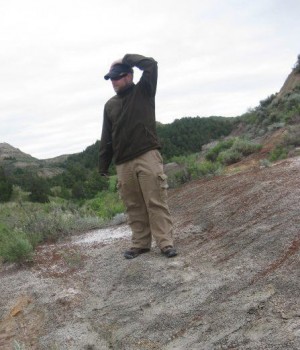 FRANK REARDON was born in 1974 in Boston, Massachusetts, currently lives in Minot, North Dakota. Frank has been published poetry and short stories in many reviews, journals and online zines. His first poetry collection, Interstate Chokehold, was published by NeoPoiesis Press in 2009 as well as his second poetry collection Nirvana Haymaker 2012. His third poetry collection Blood Music was published by Punk Hostage Press late 2013. In 2014 Reardon published a chapbook with Dog On A Chain Press titled The Broken Halo Blues. Frank is currently working on more short fiction, with a novel in mind.
FRANK REARDON was born in 1974 in Boston, Massachusetts, currently lives in Minot, North Dakota. Frank has been published poetry and short stories in many reviews, journals and online zines. His first poetry collection, Interstate Chokehold, was published by NeoPoiesis Press in 2009 as well as his second poetry collection Nirvana Haymaker 2012. His third poetry collection Blood Music was published by Punk Hostage Press late 2013. In 2014 Reardon published a chapbook with Dog On A Chain Press titled The Broken Halo Blues. Frank is currently working on more short fiction, with a novel in mind.
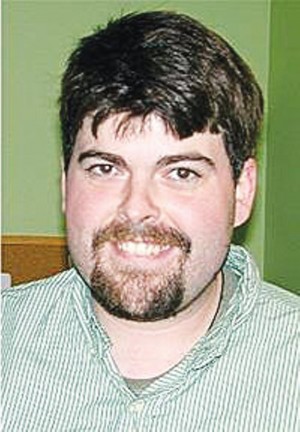 CL Bledsoe is the author of a dozen books, most recently the poetry collection Riceland and the novel Man of Clay. He lives in northern Virginia with his daughter.
CL Bledsoe is the author of a dozen books, most recently the poetry collection Riceland and the novel Man of Clay. He lives in northern Virginia with his daughter.

